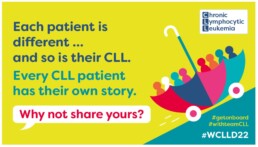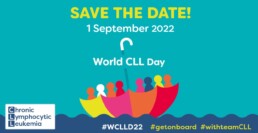“Fabulous Ladies in the Same Boat”
These are the stories of three Fabulous Ladies, Wendy, Bronwyn and Diane, all in the same boat.
Thank you and we appreciate you sharing your tales with us.

First we would like to pay tribute to the great work that Dr Neil Graham did on our behalf. He was also a mentor and an encouraging voice to so many of us.
Wendy
I’m Wendy and I’m 72. I was diagnosed with CLL 15 years ago. Until about 3 years ago my CLL had travelled through life never interrupting my work and play. Fortunately for me in September 2019 Bronwyn , Diane and I connected through the CLL website. We got chatting privately and somehow the same boat was launched.
In this time, we’ve sailed through calm waters, and we’ve weathered storms together. We are three very different women leading very different lifestyles, but we have this common thread. We have somehow found some common themes, such as: the disease doesn’t define who we are; one of us will have the wisdom or information that will solve an issue (like where to get ibrutinib from, at an affordable price), and we’re here for you - you’re not alone.
We share with each other how we’re getting on with life. Diane and Bronny truly inspire me, I don’t have enough words to thank them. We are not in constant contact but we each know that when there’s a challenge, medical or personal, the other two are only a message away. Due to Covid we’ve not had a chance for all three to join together, but one day soon. And that’s when we’ll drink our Moët across our trusty little boat’s stern.
Bronwyn
In April 2019 I was diagnosed with Small Lymphocytic Lymphoma/Chronic Lymphocytic Leukaemia at 46. Mine was an accidental discovery, a total shock. Once I got over my initial shock I wanted to know everything I could about my disease and possible outcomes and treatments. This is when I joined the CLL group. Neil Graham also reached out and chatting to him helped my understanding enormously. I'm not sure who got hold of who, but Wendy and I started privately messaging each other after seeing comments on the CLL page. Very shortly afterwards we started chatting to Diane as well. I then decided we should all chat at the same time and set up a Facebook messenger group called ‘fabulous ladies in the same boat’.
I was working full time in the Air Force when diagnosed and had one child still in the nest. Wendy and Diane are considerably older than me, but that didn't matter at all, we all had CLL. Our experience with the disease over the last few years has been very different, so sharing has been helpful. For example, Wendy and I are on ibrutinib, and Diane is on watch and wait. Sourcing ibrutinib for an affordable price is something Diane helped Wendy with extensively, so when I was making decisions later on, the leg work had already been done. Wendy got hold of me when she was in Auckland back in 2020 and suggested we catch up. I was keen to meet the person I had been talking with a lot at the time, and we got along famously.
Meanwhile Diane and I had established that she had taught with my Dad at Aka Aka School - two degrees of separation in NZ. Wendy and Diane managed to have a weekend together but unfortunately due to Covid and life, the three of us haven't been together in the same place yet. Finally, Diane and I met in person in March last year when she was on a road trip up North, it was like we knew each other already, it was lovely to see her.
Wendy, Diane, and I didn't only share our CLL stories we shared our life stories and became friends. They were there for me over the most stressful time, initial diagnosis, they understood my fear and emotions more than family and friends. I am very thankful for the connection we made and would encourage others to do the same.
Diane
And I am Diane. I was diagnosed four years ago at 72. My WBC and ALCs are much higher than my other shipmates have ever been I think (sitting at around 83.5 WBC right now), but I keep really good health with none of the accompanying symptoms as yet. I get tired from time to time but definitely wouldn’t call it fatigue (probably just old age!) I take a keen interest in this damned disease we have and the most recent developments in treatment. I use Health Unlocked and Patient Power to helpme and any other authentic sites I can to stay as informed as I can. I am so hoping that I can hold out until the drugs that are readily available in most developed countries are accessible here in NZ.
I am concerned that our most avid advocate Neil Graham is not with us anymore. We ‘fabulous ladies in the same boat’ would never have met if it hadn’t been for him.
Interestingly we have all made significant lifestyle changes since we met. It was great to meet up in ‘real life’ with Wendy and her partner Graham when they came to Nelson (I think they have since moved in together). I have moved from Nelson to Christchurch to be closer to family, and Bronny. has left the Air Force and moved to a beautiful lifestyle block in Kerikeri with her partner Scott. I am not sure what relevance that has to us all having CLL but maybe it means that we are all on the same path and trying to make the most of life!
At the beginning when we were all trying to ‘keep our heads above water ‘ with our new diagnoses we supported each other. Now that we have come to terms with our condition and know more about it we are not so reliant but know that we are always there for each other.
And as Wendy said, ‘One day we will all meet together and share that Moët!’
Pharmac's year in review leaves much to be desired
It shouldn’t be this hard when it comes to getting medicines funded. Such efforts highlight everything that is wrong with Pharmac and the way it is funded by the Government.
Patient advocate Malcolm Mulholland hopes health reforms will ensure greater and more equitable access to medicines.
Read more here: Pharmac's year in review leaves much to be desired
In Focus: From the lab to the clinic in New Zealand’s first CAR T-cell therapy clinical trial
Dr Nathaniel Dasyam is a postdoctoral researcher who has been working in the Malaghan Institute’s CAR T-cell therapy programme since 2019. Nathaniel is a self-described ‘Jack of all trades’ when it comes to his role within the programme..
Nathaniel works in the research team, where the CAR T-cells are designed, and supports both the GMP team, where the CAR T-cells are manufactured, and the clinical team, who administer the CAR T-cells to participants in the trial.
“It just so happened that the project I was working on previously at the Malaghan Institute, to test a therapeutic vaccine for melanoma, laid the groundwork for many of the processes that needed to be in place to manufacture CAR T-cells.”
This placed Nathaniel in an ideal position to help the CAR T-cell team develop methods needed to test CAR T-cells for the ENABLE clinical trial – a first of this kind for New Zealand. This was no mean feat given it involves developing a gene therapy in a highly regulated environment.
CAR T-cell therapy works by extracting a patient’s own immune cells and modifying them in the lab to identify and attack cancer cells once they have been returned to the patient. The ENABLE trial uses CAR T-cells to treat patients with certain types of relapsed and refractory B-cell non-Hodgkin lymphoma, who have exhausted other treatment options. Read more here: first-car-t-cell-therapy-clinical-trial
NZIER Community Pharmaceuticals Report 2022
NZIER has today released its 2022 Community Pharmaceuticals Report. This report looks at the overall trends in the Government-funded medicines budget for New Zealand in the 15-year period between 2006/07 and 2020/21.
We recommend reading the executive summary of the report as a starting point. Below are some key ideas which have come out of the report.
(1) The report identifies that there is a $332 million investment gap in medicines that are publicly funded and made available to patients through the public health system in New Zealand.
- This is the amount of additional investment that would be required on top of the current budget to have the same level of investment in medicines as existed in 2006/2007 in real terms (i.e. inflation and population adjusted).
- The additional investment is required because, despite some new investments being made, there have also been significant transfers of already existing medicines spending from other parts of the health system into the Combined Pharmaceutical Budget from 2012 onwards, which has hidden the fact that the core funding (community pharmaceutical expenditure) has been dropping [see Figure 2].
- As a result, when compared to the total Health budget which has grown by 1.0% in real terms over the 2006-2021 period, the community pharmaceuticals budget has decreased by 2.9% on an annual compound growth basis [see Table 1].
(2) One solution to this investment gap would be a corrective real terms adjustment of $332 million to maintain stability in pharmaceutical investment relative to other health and social investments [See Table 2].
- This corrective action approach was taken by the Government with the DHB deficits in Budget 2022. The Government has also taken a multi-year approach to funding the health system with a confirmed and committed $14.9 billion over the next four years. It is the first Budget ever to take that multi-year approach.
(3) Looking forward from 2022, the medicines budget received $191 million investment but only over a 2-year period ($72 million (2022/23)and $120 million (2023/24)), rather than a four-year period as for other parts of the system. This lack of funding commitment and stability was raised by the Treasury as the only major health budget issue in their Budget Economic & Fiscal Update (BEFU) for 2022.
- Other near-term issues include the need for the medicines budget to also include investment in COVID-19 vaccines and therapeutics going forward, which will put more pressure on an already stressed medicines budget situation.
Publicly funded community pharmaceuticals are a critical and valuable enabler for both New Zealanders' ability to self-manage health conditions and for the health system to function optimally. They, therefore, require protection from ongoing budget erosion. There also needs to be an alignment of the medicines budget appropriation to the broader health systems budget and planning cycles.
To read the full report, please click here
Help us Help you! Please join one of three CLL focus groups on 3rd or 10th of December on Zoom.
Help us help you!
We’re getting moving on some research to find out what CLL patients would like CLL Advocates NZ to do for them.
Please help us with this by joining one of three focus groups on Zoom to help us understand what issues are of greatest concern and interest to you and how we can help with them.
The sessions will be very friendly, café-style discussions with groups of 6 – 8 people and a professional facilitator, and you’ll be able to join by one simple click on an email we’ll send you. The groups will be held on :
- Saturday 3rd December 10:00am – 11:30am
- Saturday 3rd December 1:30pm – 3:00pm
- Saturday 10th December 10:00am – 11:30am
We have limited resources so we’re very keen to start the year with a fresh agenda focused on what really matters to patients and their whanau.
Please contact Melanie (our admin assistant) on clladvocates@outlook.co.nz with any questions, and to let us know if you can join one of these groups.
The information we gather from these sessions will be strictly confidential to CLL Advocates NZ and you would not need to show your full name online if you prefer.
Please help us to help you!
Pharmac is proposing to fund Ibrutinib!!!
I’m very pleased to advise that Pharmac has today asked for feedback (Follow this link) on a proposal to fund ibrutinib for New Zealanders with CLL. At last!
It’s seven years since Janssen (the supplier) first applied to Pharmac for funding for ibrutinib for patients with relapsed or refractory CLL.
CLLANZ as a patient advocacy group, and our founder the late Dr Neil Graham in particular, have battled hard over the last few years to highlight the desperate need for this treatment. I’m only sorry that Neil did not live to hear this news.
While it’s great that Pharmac is finally moving on this, it is disappointing that they’ve significantly narrowed the criteria first sought for this treatment. These were to fund it as an alternative to venetoclax-containing regimens, and for previously untreated CLL patients for whom chemoimmunotherapy is inappropriate, and notably those with 17p deletion, and TP53 and unmutated IgVH.
However the Pharmac proposal now up for consultation is to fund ibrutinib for relapsed/refractory CLL patients only after they’ve had venetoclax, or for patients where venetoclax is intolerable. So it’s not available as an alternative to venetoclax, an option clinicians have been calling for urgently for some time. Importantly, it also means it won’t be funded for patients who are currently self-funding ibrutinib, or patients receiving it on a compassionate access programme or on a clinical trial. This seems unreasonable and unfair, and we want to seek clarity from Pharmac on what will happen with these patient groups for whom treatment with ibrutinib remains a high priority.
Pharmac is inviting feedback on their proposal until 4pm on Thursday, 29 September. CLLANZ will be providing feedback and we strongly encourage you as patients and whanau to email Pharmac with your own feedback on this to: consult@pharmac.govt.nz. But we feel that it would be more effective to have a coordinated response from CLLANZ friends and supporters on this and propose to come back to you with some guidance, once we have had time to absorb the detail of the proposal and its ramifications.
Let’s not detract from the fact that today’s development is undoubtedly great news, and I’m sure we will all want to support the proposal. But we might also wish to comment on the eligibility restrictions. It may be, with sufficient encouragement and evidence from the CLL community, that Pharmac will consider extending funding of ibrutinib for all relapsed/refractory CLL patients and ideally, as a first line treatment, finally putting us in step with the rest of the world.
As you may be aware, following the highly critical report by the independent Pharmac Review Panel, Pharmac has undertaken to be more open to patient voices, and we want to take this opportunity to be heard!
With best wishes
Dr Gillian Corbett (On behalf of CLLANZ Trustees)
World CLL day
It is World CLL Day today which is held on the first day of Blood Cancer Awareness Month.
On World CLL Day we also wish to send a message of THANKS to those with healthy immunities for considering our community and showing understanding. During the COVID-19 pandemic many people experienced isolation, fear and the difficulty of keeping safe – an insight into the life of a CLL patient.
https://www.wclld.org/about-world-cll-day/
Rachel Smalley: 1,000 kiwis will die while Pharmac takes eight months to make a decision
OPINION: How long does it take you to make a decision about whether or not to buy something?
You’ve got all the information in front of you. You know it’s a good product. It works. You need it. And you’ve got the money to buy it. So how long will it take?
What if I said that every week that passes where you don’t make a decision, 26 New Zealanders will die? What then? Do you think you could focus or add some urgency to that decision?
I’m pretty sure you could.
Why is it, then, that the same level of urgency doesn’t apply to Government – and in particular, to Pharmac, our drug-buying agency?
World_CLL_Day_September_2022
CLL Advocates June Newsletter
24 June 2022


Our Thoughts at Matariki
Mānawatia a Matariki
We feel it’s appropriate on this special day to remember and celebrate the life of the founder of CLLANZ, Dr Neil Graham. Neil was a very generous, energetic, and compassionate human being who gave his time freely to help improve the lives of New Zealanders living with CLL. His work helped create a ‘community’ of CLL patients, through his personal engagement with patients, creation of the ongoing private CLL Advocates Facebook Group, and production of the first dedicated CLL Patient Booklet for New Zealanders. With a relentless focus on advocating for access to CLL treatments, Neil also raised the profile and understanding of CLL among politicians, Pharmac officials and other policy decision makers. He played a vital role in gaining funding for venetoclax.
Looking to the future, as is also appropriate on this day, the fight for better treatments goes on. In particular, after all these years of waiting, we’d like to see funding for ibrutinib for patients in need of it. But at this stage there’s no sign of any progress on that. While we welcome the release (finally!) of the Pharmac Review Panel report, we’re not greatly confident that it will lead to real change in the nature, speed, and transparency of Pharmac’s decision-making processes. After a three-month delay, releasing the report on the day Prime Minister Ardern met President Joe Biden suggests the Government may not have wanted it to get much attention! We have noted a change in Pharmac’s language but are keen to see some meaningful change in their processes.
We’re very pleased to say that CLLANZ Trustee Dr Gillian Corbett (see her bio Dr Gillian Corbett) has agreed to take on the role of Medical Director of CLLANZ.
You can contact her at: trustees@clladvocates.nz
Gillian will be able to lead or advise on our advocacy activities, but we are still looking for help to progress the priorities we outlined in our last newsletter. Please do get in touch with us if you can help in any way.
We hope you’re having a happy Matariki with family and friends, and we send our warmest thoughts and wishes to Neil Graham’s family and our thanks for all he did for New Zealanders living with CLL.
CLLANZ Trustees








